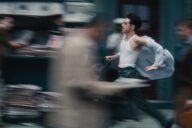The Gist
When tragedy strikes the Leigh family, everyone tries to process it in their own way: mother Annie (Toni Collette) focuses on her miniature art installations, son Peter (Alex Wolff) gets high under the bleachers at school, daughter Charlie (newcomer Milly Shapiro) hides out in her treehouse with her toys and drawings, whilst father Steve (Gabriel Byrne) tries to hold everyone together. But some things… can’t be processed. That’s as much of a gist as you’re getting from me.
The Review
Right now, I feel like one of several thousand people on the internet trying to find a way of talking about what goes on in Hereditary without going into spoiler territory. It’s a tough job, a gruelling duty. I’d even say it requires the level of bravery and precision one might expect of a heart surgeon or a soldier fighting in a war. Such is the landscape of film criticism in this day and age, but I will push on for you, dear reader.
Hereditary is about… well, a lot of things. It’s framed and shot like an overly-nihilistic Wes Anderson film, it burrows deep into the murky world of family troubles and psychological disorders, it has more than its fair share of homages to horror classics of yore, but ultimately (and let’s be real here) this film is all about Toni Collette.
I don’t want to feel overly-reductive, but Collette’s Annie is what would happen if you blended Shelley Duvall and Jack Nicholson’s characters from The Shining and let them loose on their own family. The sheer acting gauntlet that Collette has to traverse throughout the running time of Hereditary is worthy of acclaim; from detached stoicism to the brink of mania and everything in between, Collette sells every second of screen time even when things get really, really, really weird. As much as I recall and enjoyed her roles in things such as Little Miss Sunshine and Muriel’s Wedding, Collette simply disappears into Annie Leigh, never to be seen again (until her next acting gig, that is).
Not to say this is entirely the Toni Collette show, the rest of the cast do have their own little moments, even if they don’t have quite as much to work with. Gabriel Byrne’s straight-man Steve is a brilliant foil to Collette’s wild gamut of emotion and delusion, which can, unfortunately, feel at times like he’s not really present in any given scene. I can’t tell if its intentional or not, but the end result creates a damned believable performance. Likewise for Alex Wolff, whose teenage slacker of a son is just cliched enough to work within and against the situation to the point where the naturalism of the performance is impossible to classify. Simply put, the two male leads help to keep a tentative foot on reality even when it’s already drifting away. With the daughter, Milly Shapiro brings a particular spin on the classic “creepy-child” formula that horror movies have strip-mined for years, that is both its own thing and yet, decidedly not.
I find that a lot of Hereditary feels like it’s paying respect to the unnerving slow-burn horrors of the late 1960s and 1970s. There are references and lip-service to Halloween, Rosemary’s Baby, and Don’t Look Now to name a few, and as cute as they are they do drag the film down a bit with the sheer amount of horror-movie-nerd-nudge-winkery. I’m sure that’s a word. Thinking about it now, watching Hereditary made me think most of all about Ben Wheatley’s 2011 film Kill List, which just so happens to be one of my most favourite films of the past ten years. There’s this similar sense of unease and unexplained dread from the world and the incidental people in it that gradually winds up as the film goes on to a surreal climax that I guarantee will cleave audience opinion in twain.
What surely can’t divide audiences (apart from Toni Collette) is just how good the film looks and sounds. As mentioned earlier, there’s this very deliberate mis en scene (where the stuff sits in the frame) that whilst feeling as stagey as latter-day Wes Anderson it also has an element of good ol’ Stanley Kubrick. There are this wide-shot, slow-panning takes that drink in the cavernous surroundings and let the drama between the characters continue uninterrupted. There are some phenomenally well-executed reveals that show how horror can be done without resorting to a pandering, startling jump scare. Take note, James Wan of Insidious fame.
The sound design is also an exercise in the fantastic, with this creeping pulsing soundtrack that sounds like something between Johnny Greenwood’s Bodysong and what happens if you forget to feed or water Brian Eno for several months. It moves from subtle, almost-inaudible electronic heartbeats to ephemeral strings to the tensest silence I think I’ve heard in cinema for a while. It’s not overly-flashy, but gosh if it ain’t effective. Also, you will never hear a popping sound the same way again. Goodbye forever, Rice Krispies.
The Verdict
Contrary to what most trailers say, Hereditary does not flip the script on horror films, nor is it this generation’s The Exorcist or The Shining. I don’t think it’ll haunt you for weeks or leave you with as strong an image as, say, an elevator full of blood or a deranged goat that may or may not be the devil himself. Does it, however, feel like a 21st-century spiritual successor to that brand of slow, unnerving character-centric style of horror? Absolutely, yes. Is it acted and shot in a unique and mesmerizing way? You betcha. Will we still be talking about this in years to come? Only if Toni lands another Oscar nomination for it. Which she should. Trust me.



















No Comments